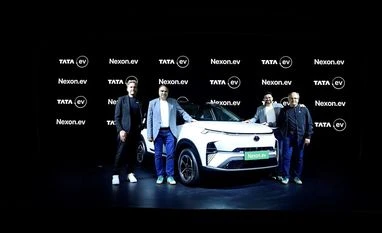Tata Motors is planning to establish separate, exclusive electric vehicle (EV) retail showrooms under its new brand identity, Tata.ev, informed a senior company executive.
The company, which unveiled a facelifted version of the market-leading electric sport utility vehicle (SUV) Nexon on Thursday (priced at Rs 14.74 lakh), introduced its new brand identity for EVs last month.
Speaking to Business Standard, Shailesh Chandra, managing director of Tata Passenger Electric Mobility, stated, “Tata.ev showrooms will evolve over time. This is necessary due to the new brand identity we have created to provide a differentiated experience to buyers. Simultaneously, we must ensure that the scale reaches a level viable for our channel partners.”
Chandra expressed the need to gradually introduce these exclusive outlets, beginning with select cities.
“Our EV portfolio will also expand in the coming years, so we need to consider this, or else we won’t be doing justice to both the internal combustion engine (ICE) and EV portfolios in the same showroom. We will assess this in the coming quarters,” he added.
Upcoming EVs from Tata Motors will range from Rs 8 lakh to Rs 30 lakh. The company has already showcased the Harrier EV, Curvv (SUV), Sierra (SUV), and Avinya (SUV), with more undisclosed products in the pipeline.
More From This Section
The new Nexon.ev features vehicle-to-vehicle charging technology, allowing it to charge other vehicles using the Nexon as a power source. Similarly, vehicle-to-load charging is enabled, allowing users to use the car as a power source for activities like picnics. Tata Motors claims this is a segment-first innovation.
The range of the Nexon.ev has improved. Chandra said that while the battery size remains the same, improvements in aerodynamics, a new-generation motor that saves energy, and low-resistance tyres have increased the range from 453 kilometre (km) to 465 km on a single charge.
As the market leader with around 70 per cent share of passenger EVs in India, is Tata Motors working on programmes to assist customers at the end of their cars’ lifecycles?
“Resale value concerns are less for early adopters. We offer a transferable warranty to maintain resale value, providing an eight-year, or 160,000 km warranty,” said Chandra.
However, he added, “We are now considering financing options for used car buyers. We may establish partnerships with intermediaries. While we haven’t crystallised anything, we are actively exploring options to develop the market.”
On Thursday, Tata Motors also launched a facelifted version of the ICE version of the Nexon, starting at Rs 8.1 lakh. The ICE Nexon was initially introduced in 2017, followed by the EV version in 2020.
“In 2017, we sold approximately 27,000 units, which grew to 172,000 in 2022-23. It has shown consistent growth over the years. Most of our customers are under 35 years old and are highly tech-savvy, viewing their cars as an extension of their lifestyles. Nexon sells around 15,000 cars a month,” Chandra said.
He also noted that the Nexon was the no. 1 SUV in 2021-22, FY23, and the first quarter of 2023-24 (FY24). In the second quarter (Q2) of FY24, production was scaled down to accommodate the facelifted version.
It is estimated that the car has sold close to 65,000 units between April and August this financial year, with a slight dip in Q2 due to planned production cuts for the facelifted version.
Approximately 55 per cent of Nexon buyers are first-time buyers, and Chandra believes the company needs to offer a different persona for the car. Early tech adopter EV buyers seek unique features in their vehicles.
Tata Motors plans to send the Nexon for safety testing under the Bharat New Car Assessment Programme (NCAP) and the Global NCAP.
Fundraising for EV biz not active right now: Chandra
Shailesh Chandra, managing director of Tata Passenger Electric Mobility (TPEML), clarified that it does not currently require funds for the electric vehicle (EV) business. However, he acknowledged the dynamic nature of the situation.
“I don’t have a fund requirement right now. Life is very dynamic, so tomorrow things can change depending on the situation. Right now it’s not active,” he said.
In 2021, the EV business secured an investment of Rs 7,500 crore from TPG Rise Climate and ADQ, housed under TPEML and valued the EV arm at $9.1 billion.
Chandra did not comment on the current valuation. Earlier reports suggested that TPEML was also exploring fundraising opportunities. Last month, Mahindra & Mahindra (M&M) announced that Singapore-based investment firm Temasek would invest Rs 1,200 crore in M&M’s four-wheeler passenger electric vehicle subsidiary, Mahindra Electric Automobile, at a valuation of up to $9.8 billion, a 15 per cent increase from its previous funding round.
Chandra explained the importance of fundraising for the EV business.
The passenger vehicle (PV) market is expected to reach 7 million units by the end of the decade, with EVs accounting for around 30 per cent, or approximately 1.5-2 million units.
Internal combustion engine (ICE) PVs are also projected to reach around 5 million units. Therefore, original equipment manufacturers cannot overlook the self-sufficient ICE PV business, which generates its own funds. EVs require a separate source of funding.
)